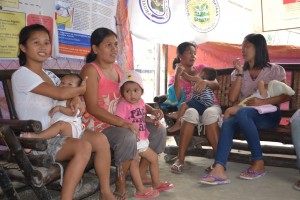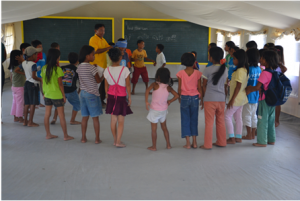Nursing mothers gather and chat inside a women-friendly space in New Bataan, Compostela Valley Province. A women-friendly space (WFS) is a designated tent inside an evacuation center or a relocation site that provides internally-displaced women with a safe place to meet, talk and help each other.

Inside a huge tent, Nenet, 25, sits in a corner breastfeeding her six – month old son. Nearby, other young mothers with their babies and toddlers engage in light banter. Nenet is one of the 1,271 women staying in the evacuation centers in New Bataan.
In an adjacent tent of similar size, blackboards were set-up, drawing materials distributed, andwhile a group of children gathered to join the games and art therapy sessions supervised by social workers and child specialists.
These are the scenarios in women and child-friendly spaces set-up in New Bataan, Compostela Valley, which was heavily devastated by typhoon ‘Pablo,’ on December 4, 2012.
“Women and children are the most vulnerable when disasters strike. It is important to address their needs especially during emergencies to bring normalcy back in their lives,” Social Welfare and Development Secretary Corazon Juliano-Soliman said.
“The establishment of women and child-friendly (CFS) spaces is also integrated in evacuation camp management which aims to respond to the effects of displacement and vulnerability of women and children in natural and man-made crisis situations, such as disasters and incidents of armed conflict,” Secretary Soliman added.
Haven for women
Recognizing the special needs of women in evacuation centers, the Department of Social Welfare and Development (DSWD), in partnership with the United Nations Population Fund (UNFPA) set-up three women-friendly spaces in Compostela Valley.
The setting up of women-friendly spaces during disasters is a concept being pilot tested by Social Technology Bureau to provide a venue where women can breastfeed their children, learn about nutrition, and issues related to well-being, women’s rights, sexual and reproductive health. gender based, and human trafficking. Moreover, it is an ideal place for counseling and stress debriefing sessions to help traumatized women cope with their situation and prepare them for eventual return to their communities. Towards early recovery phase, the women-friendly space may also be a venue for livelihood trainings.
Nolibelyn Macabagdal, Project Officer of the UNFPA’s 7th Country Programme of Assistance to DSWD, said the setting up of women-friendly spaces in evacuation camps is necessary because women are vulnerable to abuse. Macabagdal said that based on the Joint GBV and Child Protection Sub Cluster Reports, there were 131 cases of violence against women and children monitored in the four municipalities of Comspostela Valley since typhoon Pablo struck in December 2012.
As part of the services at the women-friendly space, the DSWD and partners also distribute basic necessities of women such as undergarments, sanitary napkins, and soaps, among others. Just recently, 500 women received these goods from the DSWD.
Playtime for Children

On the other hand, child – friendly spaces offer children a safe place to play and express their feelings through games, music, arts, and values formation to help them recover from the traumatic effects of disasters.
“Children experience the pain of losing loved ones after typhoon ‘Pablo’. They are also at risk of getting sick while staying in cramped evacuation centers with no power and safe water. Child-friendly spaces aim to help children cope with these challenges,” Yheleen Veso, World Vision Child -Friendly Space Team Leader for Compostela Valley said.
Child-friendly spaces provide learning opportunities for children while their schooling is interrupted due to natural and man-made disasters. For parents, the child-friendly spaces are safe places to leave their children while they work on restoring their households and communities.
Moreover, child-friendly spaces are mechanisms to promote children’s rights and welfare. “We inform parents and children on how to stay safe in evacuation centers through awareness campaigns and by linking them to authorities to curb cases of abuse and exploitation in disaster-hit areas,” explained Honey Joy Sampiano, Child Protection and Development Specialist in Mindanao.
To date, 44 child-friendly spaces were set up. Some 44 local facilitators were also trained on handling psycho-social support/activities.
Social workers and child specialists from international and local humanitarian organizations and local daycare workers also serve as volunteers in conducting activities for the children.
Some 500 children were provided with psycho-social support/activities in the child-friendly spaces, based on the report of typhoon ‘Pablo’ Protection Cluster led by the DSWD. ## #


